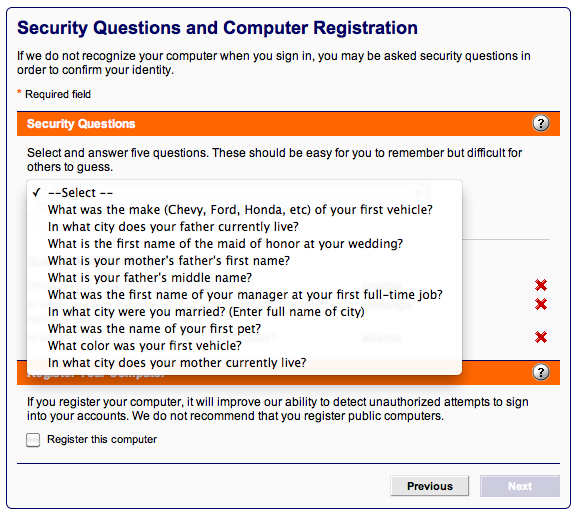Can Security Questions be Subliminally Discriminatory?
Oct 04, 2010
It’s not funny how many cultural, socio-economic, and even religious assumptions can be implicit in the design of a simple form. Here’s the form I was greeted with today when I tried to log on to ShareBuilder.
Note, I don’t want to single out ShareBuilder here; many other companies have such silly forms as well. But it just so happens to be the form I chanced upon today.

Here’s a list of the assumptions made by whoever was tasked with designing this particular form. It’s quite easy to see why these assumptions are not universally applicable. Though not outright discriminatory, these questions suggest a subliminal discriminatory preference for car-owning, married people, both whose parents are currently alive. And no, you cannot create your own questions.
-
“What was the make (Chevy, Ford, Honda, etc) of your first vehicle?” This question assumes that you own a vehicle. Many people in several countries worldwide do not own a vehicle, either by choice, or because their governments had the good sense to invest in public transportation instead of highways.
-
In what city does your father currently live? This one assumes that your father is currently alive. This doesn’t sound discriminatory until you realize that it is far more likely for younger users’ fathers to be alive than older ones’. There you go: it’s ageist.
-
What is the first name of the maid of honor at your wedding? This question assumes (1) that you’re married and (2) that you follow a religious tradition where the concept of ‘maids-of-honor’ exists in relation to weddings.
-
What is your mother’s father’s first name? This is probably the only question that’s universally answerable.
-
What is your father’s middle name? This particular question assumes that everyone has a middle name. I know people from a lot of communities where there is no concept of a middle name.
-
What was the first name of your manager at your first full-time job? This question whispers: ‘Hey students, hope you’ve had at least one job so far in your career, else we don’t quite want you here. Now go away!’
-
In what city were you married? (Enter full name of city) This one (again!) assumes you’re married. If you happen to be gay or lesbian in the wrong state or in the wrong country, you’re not even granted the right to marry, so making an assumption about marriage is adding insult to injury.
-
What was the name of your first pet? Everyone’s had a pet at some point in their lives, right? </sarcasm>
-
What color was your first vehicle? Again, this assumes you have owned a car in the past.
-
In what city does your mother currently live? Finally, this one assumes that your mother is currently alive. (again, ageist as in the second question.)
We have—thankfully—grown out of the age of blatant racial or gender discrimination (for the most part). But behind every user interface widget and every design decision we make is an invisible representation of the subconscious biases we hold in our minds. If you build a team comprising only of like-minded individuals from similar backgrounds, this is the kind of sign- up form you get. If your team includes people who have experienced a rich diversity of life experiences, you can bet their designs will be much more universal.




